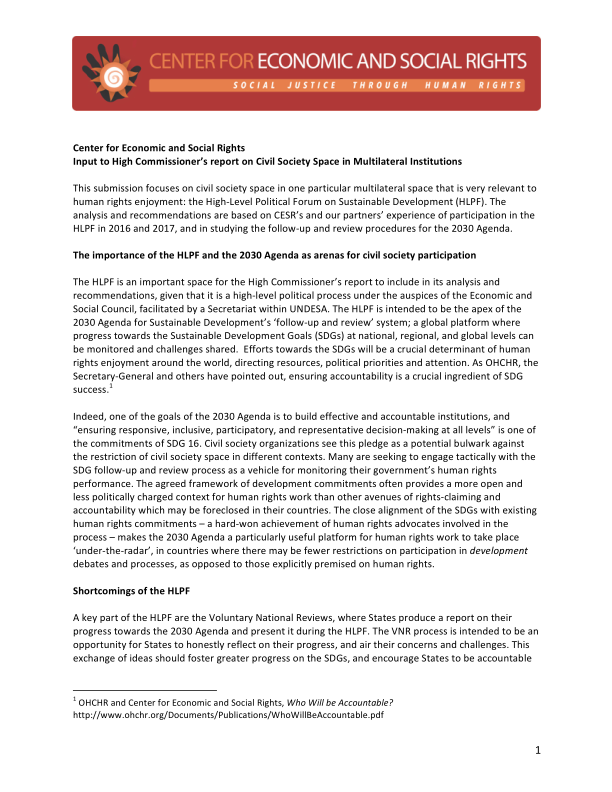This submission focuses on civil society space in one particular multilateral space that is very relevant to human rights enjoyment: the High-Level Political Forum on Sustainable Development (HLPF). The analysis and recommendations are based on CESR’s and our partners’ experience of participation in the HLPF in 2016 and 2017, and in studying the follow-up and review procedures for the 2030 Agenda.
The HLPF is intended to be the apex of the 2030 Agenda for Sustainable Development’s "follow-up and review" system; a global platform where progress towards the Sustainable Development Goals (SDGs) at national, regional, and global levels can be monitored and challenges shared.
A key part of the HLPF are the Voluntary National Reviews, where States produce a report on their progress towards the 2030 Agenda and present it during the HLPF. The VNR process is intended to be an opportunity for States to honestly reflect on their progress, and air their concerns and challenges. This exchange of ideas should foster greater progress on the SDGs, and encourage States to be accountable to their people during implementation. In order to foster such accountability and clarity about progress and setbacks, the inclusion of independent civil society perspectives is absolutely crucial.
Unfortunately, channels and opportunities for meaningful civil society participation in the HLPF were very limited, ultimately undermining the rigor and legitimacy of the process. Exhaustive "shadow" or "spotlight" reports were met with only tokenistic opportunities to participate and no acknowledgement in the Voluntary National Review (VNR) segments of the HLPF. Without official space for alternative reporting, as is common in Geneva-based processes, States’ accounts of progress went unchallenged throughout the VNR process.
Especially given the dubious rigor of some of the official national reports and the underwhelming SDG progress in many contexts, this marginalization and tokenization of civil society participation seriously undermines the credibility of the VNR process and the whole HLPF. Moreover, while space for civil society is being actively closed down by governments in many parts of the world, the HLPF should provide a counterbalance, an opportunity for engagement and a place where government action can be subjected to scrutiny.
Improvements to civil society participation in the HLPF could be shaped by the following recommendations:
1. More time for VNRs, and more time for civil society perspectives within them.
2. Give official recognition to alternative/’shadow’ reports.
3. Incorporate more voices from marginalized and disadvantaged groups.
4. Encourage robust peer review.
Read the full submission here.
